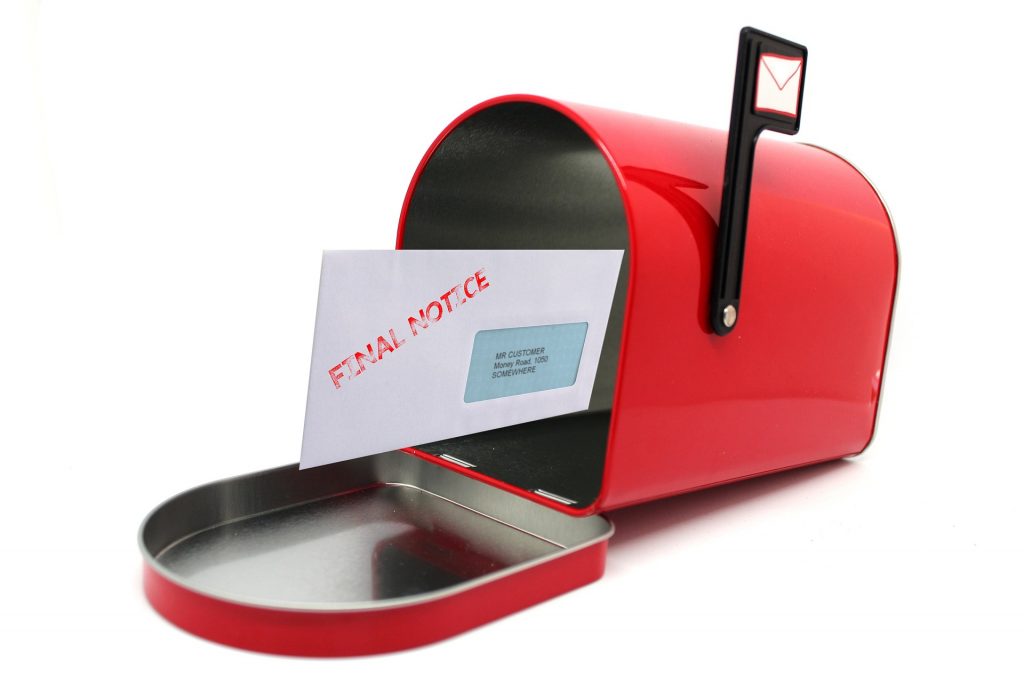 - minute read
- minute read

One of the biggest concerns for landlords is tenants who don’t pay their rent. Having to deal with non-payment of rent is a time-consuming and stressful process – one which can also drop landlords into financial difficulty. With this in mind, knowing you and your tenants’ rights, along with the legal process for when rent isn’t being paid can make a world of difference. Carefully following every step will ensure that no further issues arise on your end.
In anticipation of a problem like a tenant not paying rent, you should already be keeping track of rent payments that are due and have been paid, especially if you have multiple tenants. This should be tracked with proper documentation. You should also send receipts to your tenants each month, with the receipt containing the date rent was paid, along with the amount.
Doing this is especially useful if you have multiple tenants in a property who all pay separately, as you’ll be able to quickly spot who has and hasn’t paid. With this in mind, you should remind tenants in a joint tenancy agreement that they’re all responsible for paying rent and clearing any debt as a single unit. Quickbooks is a great option for keeping track of your accounts.
If you do decide to start eviction proceedings, then you’ll need copies of all rent payment transactions.
If your tenants aren’t paying rent then the one thing you shouldn’t do is sit tight and cross your fingers that they’ll get round to it. Instead, have a conversation to find out what the problem is. They may have had a short-term issue that affected their cash flow. If this is the case, then there’s a good chance you’ll be able to sort out a solution. If they can’t afford to rent and are willing to leave the property then it may be best to accept the loss of rent and let them break the contract so you can find a new tenant. Either way, talking calmly is always a positive first step.
If a conversation doesn’t do the trick, then send a formal written demand, preferably by hand-delivered mail. This letter should ask for outstanding arrears to be immediately paid, along with any future rent being paid on time. Mention that failing to pay could lead to court action.
Depending on how good the relationship is with your tenant, you could consider reducing the rent for a short time, if only to help them out a little. Doing this may save you the effort of having to find a new tenant. Just be clear that the reduction is only a temporary solution.
If your tenant has a guarantor, you should write to them after 14 days of the rent being due. If the matter still isn’t resolved, then you can write to them another 7 days after this. You’re best off sending the guarantor a letter which advises them that the tenant hasn’t paid rent according to the tenancy agreement.
At the same time (14 days after rent is due), send another letter to your tenant, explaining that if rent isn’t paid then you’ll be forced to take the matter further and seek possession of your property. Payment is usually received fairly soon after sending these letters.

Once rent is a month overdue and the following month’s rent is now due as well, your tenant is classed as being two months in arrears. At this point, you can start the process of seeking possession of your property.
Under the Housing Act of 1988, there are two types of notice you can then serve to tenants – a Section 8 or a Section 21 notice. These are what landlords use to evict tenants living in England and Wales.
By failing to pay their rent, your tenant has broken the terms of their tenancy agreement. This means that you can serve them a Section 8 notice. Effectively, this lets your tenant know that if they don’t pay within a further 14 days, you plan to take them to court.
To serve your tenant a Section 8 notice, you need to:
If you’re still within the fixed term of your contract (this is normally in the first 4-6 months) then a Section 8 notice is needed.
Serving a Section 21 notice is a way of informing your tenant that you intend to regain possession of the property. Right now, you can use Section 21 to give notice of possession without having to provide a reason during a tenancy with no fixed end date (or at the end of a fixed-term tenancy).
You aren’t allowed to serve a Section 21 during the first four months of a tenancy, or if you’ve failed to meet certain obligations as a landlord (such as not protecting your tenant’s deposit in a government-backed scheme, not giving your tenant copies of the property’s energy performance certificate or gas safety certificate).
If you’re still unsure which notice to serve, then we’d recommend getting legal advice before taking any further action. The government has pledged to end Section 21 evictions, though no kind of date has been given as to when that’ll happen yet.
If your tenant doesn’t respond to rent demands, then you’re entitled to take legal action in seeking possession of your property. At the same time, you can also ask the court to make a judgement against your tenant concerning rent arrears and any costs incurred by this. To boost the chances of a successful claim, you should collect all evidence that shows you’ve correctly followed the process.

The court can order the tenant to do one of the following:
With that being said, a judge will dismiss your case if they fail to see a reason for the tenant to be evicted (or if you’ve failed to follow the correct procedure).
Landlord insurance products are available to cover you for the loss of rent and any costs that come with evicting a tenant. You might want to consider getting landlord insurance if a tenant going into rent arrears could cause you to have financial difficulties.
Landlords can use security deposits to cover unpaid rent. Other cases that reasonable deductions from deposits can be made include property damage, missing items or unapproved changes to the property.
If rent isn’t paid, then the money owed is referred to as ‘rent arrears’. Rent arrears is known as a ‘priority debt’, meaning the consequences of it not being paid can be severe (such as a risk of eviction). Because of this, rent arrears should be prioritised over other debts that a tenant may have.
The exact answer to this varies, depending on the type of tenancy agreement you have with your tenants. As a general rule though, a tenant needs to be two months behind on their rent (or eight weeks if paying weekly).
To start the eviction process, landlords need to follow a certain process which is called ‘seeking possession’. Serving a section 8 notice to your tenants indicates that you intend to take them to court if they don’t pay their rent arrears within a further 14 days.

Yes, a landlord can charge interest on rent arrears. If rent is unpaid for 14 days or more, then interest can be charged from the day the rent became due until payment is received. In this case, the interest rate is 3% above the Bank of England’s base rate and is payable for each day that the payment is outstanding.
If all goes well, a quick conversation with your tenant will be enough to resolve any issues surrounding unpaid rent. However, if this isn’t the case and your tenant doesn’t respond to your messages then the next thing you should do is contact their financial guarantor. This person may be able to pay the rent for their tenant, or get in touch with them on your behalf at the very least. If any other references are listed then these could be contacted as well.
A tenant who refuses to leave is every landlord’s worst nightmare. If all reasonable attempts to get them to leave have already failed, then you can go through the process of legally possessing your house. This process starts with serving notice to the tenant(s) that you’re seeking possession.
Resooma is on a mission to add trust and transparency to the lettings market and can help agents and landlords get more qualified leads and better tenants. Request a callback to find out more about listing with Resooma.



All your utility bills in one monthly payment, split between housemates
Get a quote


All your utility bills in one monthly payment, split between housemates
Get a quoteFinding his article helpful? We’ve got plenty more helpful articles on there way. Join our Savvy Sunday mailing list